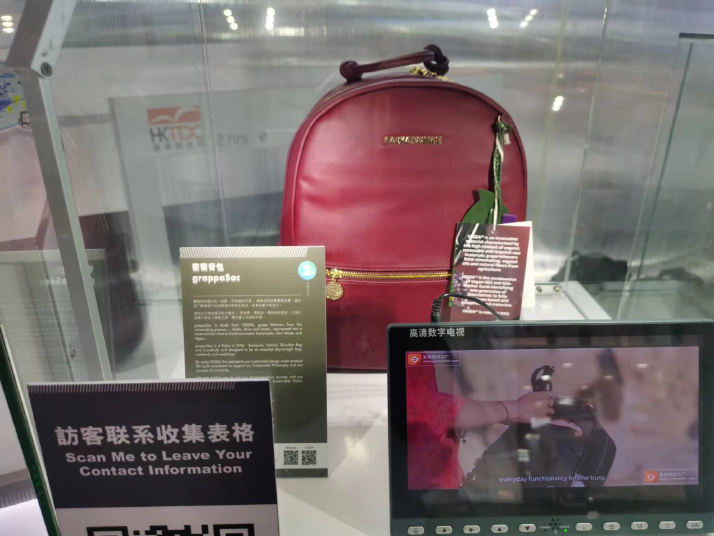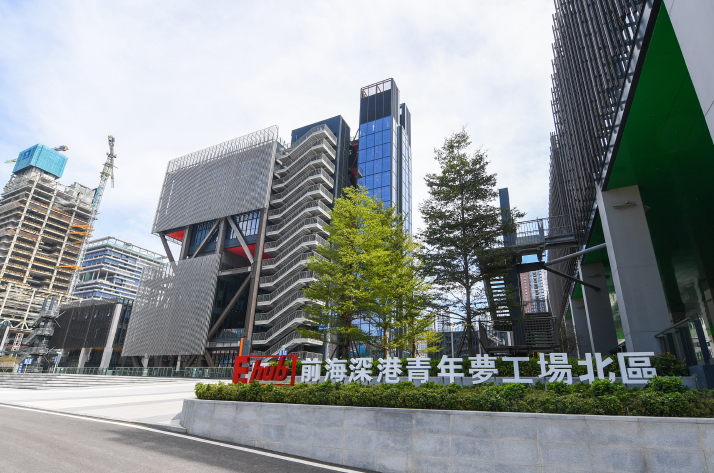| Business |
| Enterprises in the Greater Bay Area seek greater opportunities | |
|
|
 An iFarmaissance bag made of grape leather on display at the 2022 China International Fair for Trade in Services in Beijing (LI XIAOYANG)
iFarmaissance, a sustainable fashion brand based both in China's Hong Kong Special Administrative Region (SAR) and Australia, debuted on the Chinese mainland in 2022. Its innovative handbags and backpacks soon attracted many consumers. Instead of using animal or synthetic leather, the bags are made from grape leftovers generated during winemaking, but are still largely similar in appearance and durability to traditional bags. Concerned about the growing negative impacts of leather production on the natural environment, Chui Lan Jennifer Chan, a designer from Hong Kong, cofounded the brand with her husband in 2021 to promote vegan leather. "Increasingly, environmental and social concerns are changing consumers' behavior, making the vegan leather market grow fast," Chan told Beijing Review. In addition to grape leather produced by VEGEA, an Italian vegan leather company, iFarmaissance also uses apple, cactus and pineapple leather alternatives in its products. The brand's own plant-based material is in the research phase as well. According to Chan, her company's revenue to date has doubled year on year since its inception. With a team in Shenzhen, Guangdong Province, iFarmaissance's expansion on the Chinese mainland, in particular, has gained momentum. "The Guangdong-Hong Kong-Macao Greater Bay Area (GBA) represents an enormous opportunity for iFarmaissance, both as a manufacturing base and as an innovation hub. It also allows the brand to explore the emerging market on the Chinese mainland," Chan said. Covering an area of 56,000 square km, the GBA consists of Hong Kong and Macao SARs and the cities of Guangzhou, Shenzhen, Zhuhai, Foshan, Zhongshan, Dongguan, Huizhou, Jiangmen and Zhaoqing in Guangdong. It is one of the most open and economically vibrant regions in China. The Chinese Government released the outline development plan for the GBA in February 2019, containing targets including turning the area into a vibrant world-class city cluster and a globally influential international innovation and technology hub. Booming business Enterprises in the GBA have thrived through opportunities created by the interconnected area. As of June, the number of unicorn companies, or startups valued at more than $1 billion, in the area had reached 66, accounting for 18.5 percent of the total across China. At the 2023 Guangdong-Hong Kong-Macao Greater Bay Area Fair for Trade in Services, which took place in Zhuhai from December 6 to 8, over 2 billion yuan ($278.9 million) of intent purchase deals were signed. China's fast-fashion e-commerce platform SHEIN, one of the participants, attracted over 300 enterprises for business consultation on December 6 alone. SHEIN, a unicorn company founded in 2008, is now based in Panyu District of Guangzhou. Today, it serves consumers in over 150 countries and regions, with over 120 million registered users. Its total turnover in the first nine months of this year reached around $24 billion, up over 40 percent year on year. The clothing industry in Panyu, which used to be large in scale but with low efficiency, is moving higher on supply chains. SHEIN has helped pioneer the digitalization of local apparel industries. According to the company, it is adopting smart systems to make real-time analysis of fashion trends and sales to reduce inventory and enhance the monitoring of quality. There are now over 30,000 apparel enterprises in Panyu, including more than 7,000 clothing manufacturers. SHEIN has developed flexible clothing supply chains integrating local small and medium-sized businesses. It has also developed overseas warehouses and operation centers, as it aims to support 10,000 global sellers to each register over $1 million of annual sales in the next three years. The GBA has incubated and nurtured technology companies. Shenzhen-based ZTE, for example, is a global leader in telecommunications and information technology. ZTE employee Zhang Chen told Beijing Review that the company has provided 5G-enabled technologies for Guangzhou's smart subway network and automated vehicles in Suzhou, Jiangsu Province. ZTE has also introduced an automated guided vehicle (AGV) for the logistics industry. The AGVs are able to complete over 98 percent of transportation work inside factories through 5G sensors that identify routes and avoid collisions, Zhang said. "ZTE has launched digital platforms for improving efficiency at ports and ensuring safety in the mining industry, as well as systems based on big data and sensors for monitoring gas leaks, flooding and electricity supply problems in cities," he said. Covering more than 160 countries and regions, ZTE serves more than one fourth of the world's people. In the first half of this year, around 29 percent of its total operating revenue, roughly 60.7 billion yuan ($8.4 billion), came from international markets. Besides ZTE, many Chinese tech firms like Huawei, Tencent and DJI are also headquartered in the GBA. According to Pan Helin, a researcher at the International Business School of Zhejiang University, enterprises in Guangdong were early starters in opening up. The presence of completed industrial chains and infrastructure has allowed many local companies to develop a firm footing in their industries. "Many micro and small businesses in Guangdong are still facing the challenge of high costs in digital transformation. Digital technology enterprises should further empower small businesses so that they are not left behind," Pan told Beijing Review.  The Qianhai Shenzhen-Hong Kong Youth Innovation and Entrepreneur Hub in Shenzhen, Guangdong Province, in October 2022 (XINHUA)
With open arms In the first three quarters of this year, paid-in foreign direct investment in Guangdong totaled $19.25 billion, with that from European countries and the United States growing 150 and 15.7 percent year on year, respectively. Over 310,000 foreign-funded projects have been established in the province, and 350 of the Fortune Global 500 companies have invested there, according to the provincial government. Foreign-invested companies are finding growing opportunities in the GBA. U.S. food and beverage giant PepsiCo began producing its Pepsi-Cola in Shenzhen in the 1980s. Xie Changan, CEO of PepsiCo Greater China told the 2023 Global Investment Promotion Conference on the GBA in Guangzhou in November that PepsiCo invested another 200 million yuan ($27.8 million) into expanding its beverage production facilities in Guangzhou last year. The GBA is a key area in PepsiCo's business planning, Xie said. The GBA is increasingly becoming a hub of integration. The Qianhai Shenzhen-Hong Kong Modern Service Industry Cooperation Zone, established in 2010, has been boosting international economic cooperation over recent years. In the first half of this year, paid-in foreign direct investment in the zone exceeded $1.956 billion. In September 2021, the central authorities issued a general plan for advancing the development of the Guangdong-Macao In-Depth Cooperation Zone in Hengqin. Hengqin is an island within Zhuhai, adjacent to Macao. According to the economic bureau of the cooperation zone, the zone now has over 10,000 tech companies, including nearly 800 firms with investment from Macao. Born in Macao, Ho Kuok Tou founded Pachira Era (Zhuhai Hengqin) Information Technology Co. Ltd. in 2018. Booming digital economy and new technology in the zone have provided great opportunities for his company. Pachira has introduced its artificial intelligence technology for building intelligent cities, managing smart hotels and facilitating government work in the cooperation zone. Its speech recognition technology for smart driving has been adopted by multinational car makers, including Hyundai and Toyota. Ho said he believes the zone will become a bridge linking the international market and the market on the Chinese mainland through Macao, giving a boost to the flow of professionals and funds. According to Pan, Guangdong, Hong Kong and Macao have complementary industries. With efforts to further align the area's business rules and regulations to international standards, foreign investors will find the area increasingly accessible. Growing foreign investment will also facilitate the modernization of traditional industries in the area, he concluded. (Print Edition Title: Boom at the Bay) Copyedited by G.P. Wilson Comments to lixiaoyang@cicgamericas.com |
|
||||||||||||||||||||||||||||||
|
